Water and Sewer Systems
The City of Vaudreuil-Dorion operates a filtration plant and several wells to provide drinking water to its citizens. It also manages wastewater treatment works in the sectors served by the municipal sewage system.
Drinking water
Drinking water is supplied by the filtration plant, which draws its raw water from the Ottawa River. The filtration plant also serves the neighbouring municipalities of Vaudreuil-sur-le-Lac and L’Île-Cadieux. Its capacity increased from 18,000 to 40,000 cubic metres of water per day after a second water intake was added and a plant upgrade and expansion project was carried out between 2012 and 2016.
The main process steps are as follows:
- Raw water intake
- Low-pressure pumping
- Ozonation pre-treatment
- Sedimentation
- Filtration
- Ozonation post-treatment and disinfection
- Chlorination
- Adjustment of pH
- High-pressure pumping (distribution)
See the Vaudreuil-Dorion water course.
Dorion is supplied by two pumping stations with a total of seven wells. The groundwater undergoes the following processes: disinfection, softening (colour and corrosion inhibitor), distribution to consumers and storage in the water tower near Place Dumont.
In autumn 2022, the Bélair sector (435 homes) was transferred to the Blue network (formerly Vaudreuil). Only the areas in red on the map are now served by the Red network (formerly Dorion).
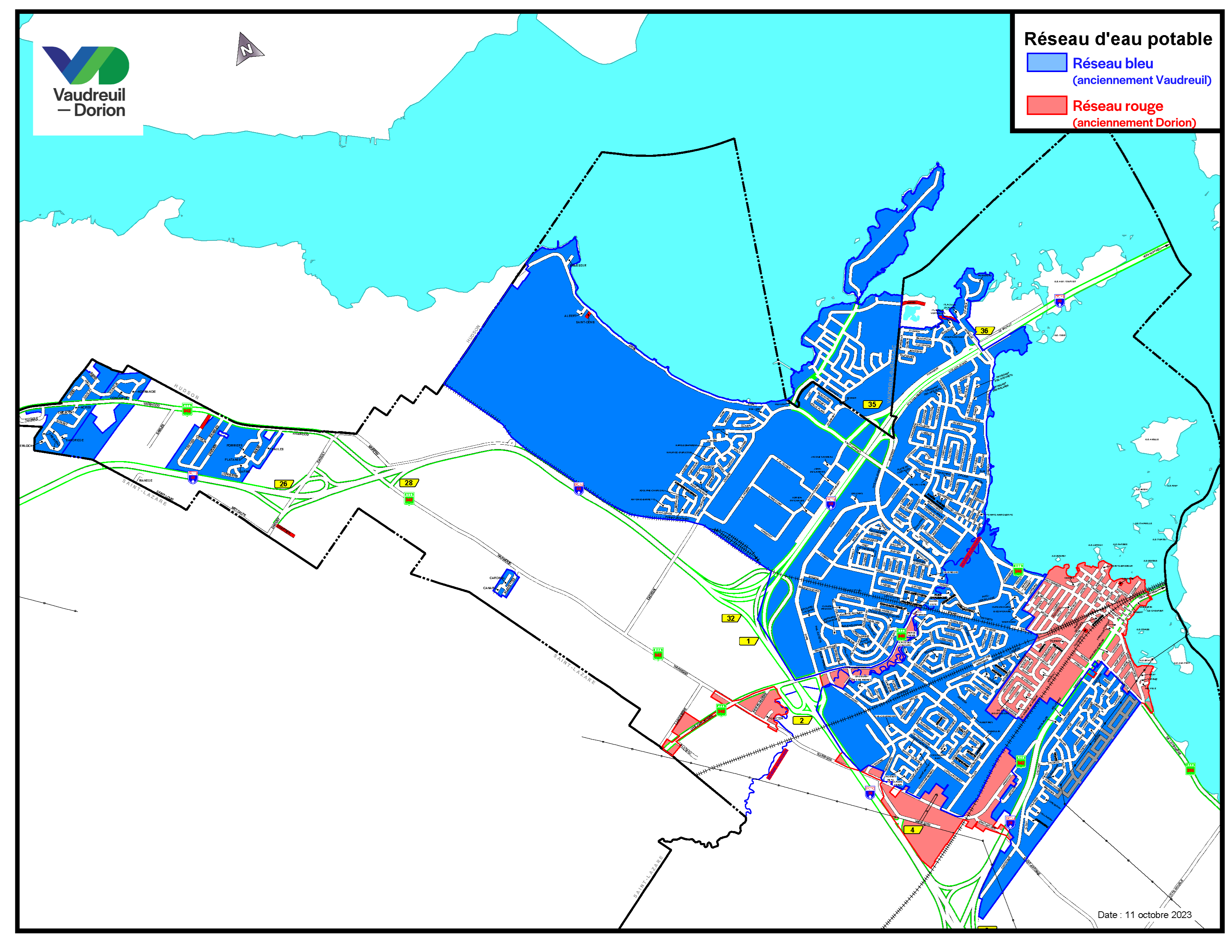
Wells
The Hudson-Acres and Ritchie segments are connected to the distribution network of the filtration plant since June 26, 2019 and are now part of the Blue (Vaudreuil) system.
The Murphy sector gets its drinking water from the system in the municipality of Hudson, while the Haute-Rive Summerlea sector is supplied from Pointe-des-Cascades.
Protection plans for drinking water quality
The City has drawn up three protection plans for each of the drinking water sources supplying Vaudreuil-Dorion, corresponding to a Category 1 facility:
Quality of drinking water
The Ministère de l'Environnement et de la Lutte contre les changements climatiques requires that the agency responsible for a drinking water distribution system produce a report on the quality of the water delivered for human consumption during the period from January 1st to December 31st of the preceding year. This report must include the minimum number of samples required under the Regulation respecting the quality of drinking water (RQEP), the number of samples taken for each parameter, as well as the number of samples tested by an accredited laboratory during this period.
2024 Water quality reports
2023 Water quality reports
2022 Water quality reports
Conference
The journey of water: from the lake to the tap and back to the lake
by Christian Gendron, Director of the Water Department of the City of Vaudreuil-Dorion
Boil Water advisory
Boil Water advisories are aimed at protecting public health. They may be issued as a precaution, for example if there is a risk of contamination following repairs to a water main, or if tests on raw water (before treatment) show levels exceeding the guidelines. The municipality is then required by law to issue an advisory, even if the test results were for untreated water.
When water is boiled for a minute or more, all potentially harmful micro-organisms are killed.
If water is not fit for drinking even after boiling, a Do Not Use advisory will be issued and the City will take special measures to ensure that the public is informed.
How does the City inform citizens of a Boil Water advisory?
If the advisory targets a small area, such as a few streets affected by a broken water main, the Public Works Department will hang a notice on the door of each home. If a large part of the city is affected, various means are used to inform the public:
- An automated calling system can reach you by phone or text message. Please make sure you are signed up.
- An urgent message will be permanently displayed on the City's website.
- It will appear on the City's Facebook page and Twitter account.
- It will appear on the electronic billboards at roads entering the city.
- The media will also be informed.
What to do in the event of a Boil Water advisory
Until further notice, you must use bottled water or water that has boiled for at least one minute for the following:
- Drinking water or using it to mix drinks
- Preparing baby formula or baby food
- Washing and preparing foods eaten raw (fruit and vegetables)
- Preparing foods that do not require prolonged cooking (canned soup, desserts, etc.)
- Making ice cubes
- Brushing your teeth and rinsing your mouth
You may use unboiled tap water for the following:
- Washing dishes in hot water, but be sure to wipe them thoroughly dry
- Washing clothes and taking a shower or bath
- When bathing small children, make sure they do not swallow any bath water.
Schools, businesses, shops and institutions
Inform your clientele that the water is unfit for consumption. Shut off all drinking fountains and post notices in places where water remains available.
Read the pamphlet produced by the Ministère de la Santé et des Services sociaux to find out more about what to do in the event of a Boil Water advisory.
Protection plan for drinking water sources
Drinking water is a precious resource that must be protected. As a user of this resource for the production of drinking water, the City is in the best position to ensure its preservation and to lay the foundations for effective protection in order to maintain water quality.
At the request of the Ministère de l'Environnement, de la Lutte contre les changements climatiques, de la Faune et des Parcs (MELCCFP), the Ville de Vaudreuil-Dorion commissioned a specialized external firm to conduct a vulnerability analysis of its drinking water sources. The Drinking Water Source Protection Plan (DWSPP) follows on from this analysis, and is based on the observations and recommendations made by TechnoRem in 2021. Its objective is to ensure the sustainability of drinking water sources for present and future generations.
Although not mandatory, the implementation of the PPSEP will provide a framework, secure and optimize the efforts and investments already made by the city to protect drinking water sources.
This plan is an essential first step in preserving this vital natural resource. It is based on a transparent approach, founded on the expertise and skills of municipal teams.
The Ville de Vaudreuil-Dorion has also benefited from financial support from the Gouvernement du Québec, granted as part of the 2020-2021 budget.
Lead in drinking water
The Ministère de l’Environnement et de la Lutte contre les changements climatiques, de la Faune et des Parcs (MELCCFP), through the Regulation respecting the quality of drinking water, requires municipalities to take samples from homes to measure the concentration of lead and copper in drinking water. In addition, if the results of an analysis exceed the standard for lead, the MELCCFP requests that an action plan to reduce lead in drinking water be prepared and disseminated.
To ensure a supply of drinking water that meets the standards provided for by provincial regulations, the City of Vaudreuil-Dorion has developed a plan to determine which areas of the territory should be prioritized regarding the presence of lead in drinking water. The resulting actions will allow for the planning of necessary work and the implementation of corrective measures as needed and will keep citizens informed of progress made with the plan. The City of Vaudreuil-Dorion shares the government’s concerns about the possible presence of lead in drinking water and is committed, through this plan, to taking preventive action to reduce it if need be.
Government References
Identifying a lead service connection
You can perform a visual inspection of your water supply line:
- Locate the private portion of your water supply line. It is often found in the basement on the wall facing the street.
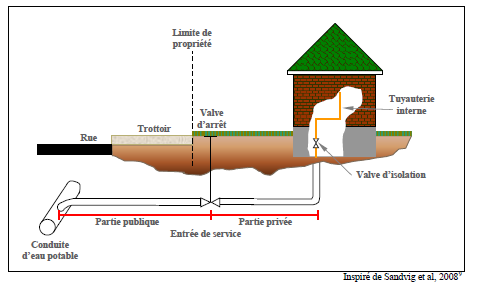
- A lead pipe:
- Does not attract magnets;
- Is easy to dent or scratch with a knife;
- Does not resonate when struck with a metal object;
- Is grey in colour;
- Here are some pictures showing lead service connections:

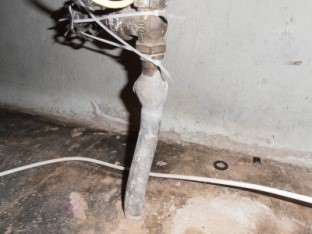
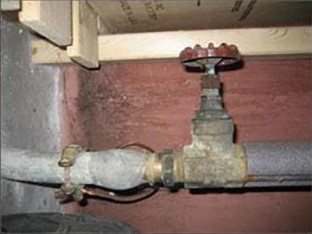
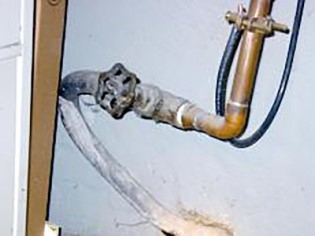
- If you require more information, the Ministère has created a guide for monitoring lead in drinking water. Section 3.1, entitled ''Repérer les entrées de service en plomb'', can serve as an effective tool.
Health Risks
In general, exposure to lead in drinking water is low and there are few health risks. Children under 6 and pregnant women (for the unborn child) are, however, more sensitive to the effects of lead than adults. The health effects of exposure to lead over several years are mainly neurobehavioural in nature, such as a decrease in learning ability. They depend on the frequency and length of exposure as well as the lead concentration in water. To find out more, visit the Quebec government website.
Protection and Prevention
Listed below are some smart habits to adopt to reduce the concentration of lead in the water you consume:
- To eliminate water that has stagnated in the service connection, allow the tap water to run for a few minutes until it becomes cold (cool in summer), allowing one or two additional minutes before drinking it, especially if it has been sitting in the pipes for a long time (in the morning and when getting home from work for example). Flushing a toilet, taking a shower or doing laundry are other ways you can flush a significant amount of water that has stagnated in the piping;
- When preparing food, infant formula and beverages, use only cold water from the tap. Hot water tends to contain more lead;
- Remove and clean the aerator (small filter) located in the faucet’s spout on a regular basis, as lead might accumulate there;
- You can also use a filtering pitcher or install a filter on the faucet or beneath the sink. These devices must be certified to comply with NSF/ANSI Standard n° 53 for lead reduction. You can purchase them from hardware stores and some large retailers. Make sure the system remains effective by replacing the filters on the devices on a regular basis and by following the manufacturer’s maintenance recommendations. In the case of a filtering pitcher, make sure to let the water run for a few minutes so the water is cool before filling.
Caution! Boiling water with the hope of removing lead is pointless, as lead does not evaporate, and boiling may even increase its concentration in the water.
Have my tap water analyzed
You would like to have your tap water analyzed to check the concentration of lead. Your home must be served by the Vaudreuil-Dorion distribution network. You can verify this information by entering your address in the Search by address tool. Your residence must be a single-family home or a small building with a maximum of two to eight units.
Buildings that are non-eligible:
- A residence in Vaudreuil-Dorion supplied by a private well;
- Any building used for industrial, commercial or institutional use, whether or not it is supplied by the Vaudreuil-Dorion distribution network.
For buildings that are not eligible, you must contact an accredited laboratory at your own expense.
Sampling campaigns take place every year from July 1st to October 1st inclusively. Please fill out the form and send it by email to filtration@ville.vaudreuil-dorion.qc.ca.
We will contact you to schedule an appointment.
Water main flushing
Each year—usually in April and May—the City flushes the water mains and inspects the fire hydrants. This work is done at night, between 10 p.m. and 6 a.m. To flush out sediment and mineral build-up, the valves are opened, allowing the flow of large quantities of water which are discharged through the fire hydrants. The flushing is done through predetermined routes that ensure optimum cleaning.
Because it is a large-scale operation, it can cause a slight drop in water pressure; it may also cause the water to be rust-coloured, which can lead to certain inconveniences such as stains on fabrics. Clothing and dishes should therefore be washed between 6 a.m. and 10 p.m. on weekdays or at any time on weekends. If your water looks rusty, turn on the cold water in your bathtub and let it run until it is clear.
Water lines
To request service, contact the Public Works Department at 450-455-3371 or t.publics@ville.vaudreuil-dorion.qc.ca.
Opening and closing of water lines
The Public Works Department is responsible for opening and closing water lines for road work. Before you call a plumber, please allow a 48-hour or 72-hour wait period, since the City has to check the condition of the equipment.
-
If the water inlet is functional, once verified, the Public Works Department will contact you to schedule an appointment, depending on the availability of the parties involved, to open or close the water inlet.
-
If the water inlet is found to be non-functional, additional time will be required for repairs. It is not possible to specify these. Once the water inlet is repaired and functional, the Public Works Department will contact you to schedule an appointment, depending on the availability of the parties concerned, to open or close the water inlet.
-
Please note that there will be two closures per day, at 8 a.m. and 8:30 a.m., Monday to Thursday.
Location and relocation of water lines
Before undertaking any landscaping projects in front of your property or paving work in a driveway, it's important to locate the water inlet. To find out where the water inlet is on your property, or to have it adjusted, contact the Public Works Department, which will take care of the work. Levelling of the water line may be necessary following driveway repairs. Only city employees are authorized to handle municipal water lines.
- You must allow a period of 10 days for this.
- Relocation of the water line, depending on the work planned, can take up to 20 days.
Check valves
City of Vaudreuil-Dorion regulations require the installation of a check valve for all residences, regardless of the year of construction. It's a safe way to prevent sewer backups.
It must be installed on horizontal connections receiving wastewater from all appliances, including floor drains, holding pits, interceptors, tanks and all other traps in basements.
All valves must be easily accessible for maintenance and cleaning. Regular checks are essential to ensure proper operation. To do this:
- Unscrew the access plug and check the condition of the gasket. Replace if necessary.
- Remove the swing door to clean and check the condition of the rubber seal; replace if necessary.
- Clean the hinge, which must be free of debris.
- Reinstall the swing door in the correct direction, ensuring the correct swinging motion.
- Screw the access plug back on tightly, and replace the access cover if necessary.
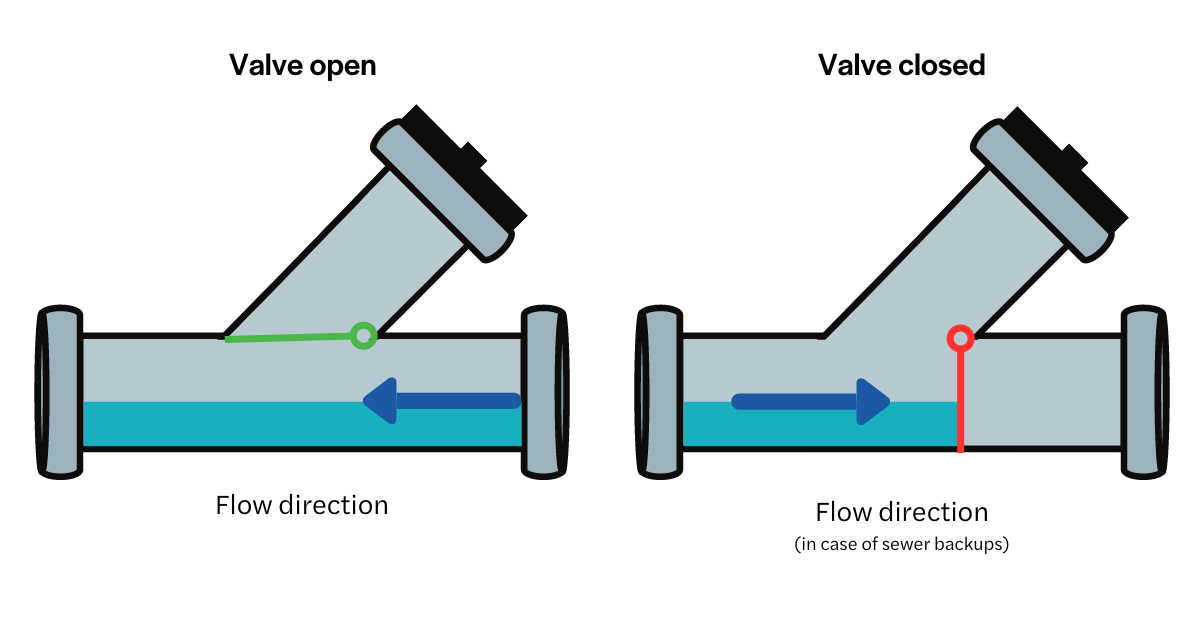
More details on the Régie du bâtiment du Québec website.
Sump Pump
The sump pump is used to evacuate water collected from the French drain or groundwater.
It's essential to regularly check that your home's sump pump is working properly. A back-up pump or emergency power system can also be very useful in the event of pump failure, particularly during a heavy rainstorm or power outage.
Please note that back-up pumps powered by municipal water are prohibited.
Wastewater
The City of Vaudreuil-Dorion has its own wastewater treatment plant consisting of three units: liquid treatment, sludge processing and odour control. The plant has a capacity of 36,550 cubic metres per day and its main pumping station can handle 50,000 cubic metres per day.
Liquid treatment
- Low-pressure pump
- Pre-treatment (screening, grit removal)
- Biological treatment [SBR (Sequencing Batch Reactor, commissioned in 1998), MBBR (Moving Bed Biofilm Reactor, commissioned in 2017)]
- Sedimentation
- Ultraviolet disinfection
Sludge processing
- Sediment and activated organic sludge pumping
- Sludge storage and mixing tank
- Sludge dewatering (conditioning, rotary drum thickeners, centrifuges)
- Sludge transportation and reclamation
Odour control
- Foul air from the new facilities is sent to the BIOREM odour control system (ventilation of basins and rooms, air humidification, biofilter media, exhaust duct).
- The air in certain rooms is treated by activated-charcoal filter units.
Septic systems
A septic system, which consists of a tank and septic field located on your property, treats wastewater and releases it into the groundwater. The water is cleaned through natural decomposition processes.
The septic field has a limited lifespan that depends on the quantity of wastewater treated, soil type, and frequency of tank maintenance and pumping. Proper maintenance will prolong the system's service life.
The discharge and treatment of wastewater from isolated homes is governed by a 1981 provincial regulation which each municipality is responsible for enforcing. Pollution by septic systems is of course strictly prohibited. Any system that is outdated must be replaced. If your property has a septic system, be sure to empty the tank every two years. Keep your receipt and send a copy to the City by email at infourbanisme@ville.vaudreuil-dorion.qc.ca as proof of maintenance.
If the grass over the septic field is very green or spongy, if there is an odour, if a grey or black liquid appears at the surface or if wastewater is not discharging well, it could mean your septic system is not working properly. A septic tank that has not had proper maintenance can cause serious problems: contamination of drinking water, sewage backups, impacts on your health and the environment, and decreased property value. The proper functioning of your septic system is your responsibility.
How to maximize the performance of your septic system
- Use biodegradable products
- Use phosphate-free soaps
- Conserve water
- Avoid compacting the soil
- Avoid saturating the ground with water
For information on this topic, contact the Permits and Inspections Division.
RV Pumpout Station
* The station is open from early May to late October. In 2024, it will be exceptionally open from April 19.
A pumpout station is accessible 24/7 on the site of the wastewater treatment plant located at 2565 Paul-Gérin-Lajoie.
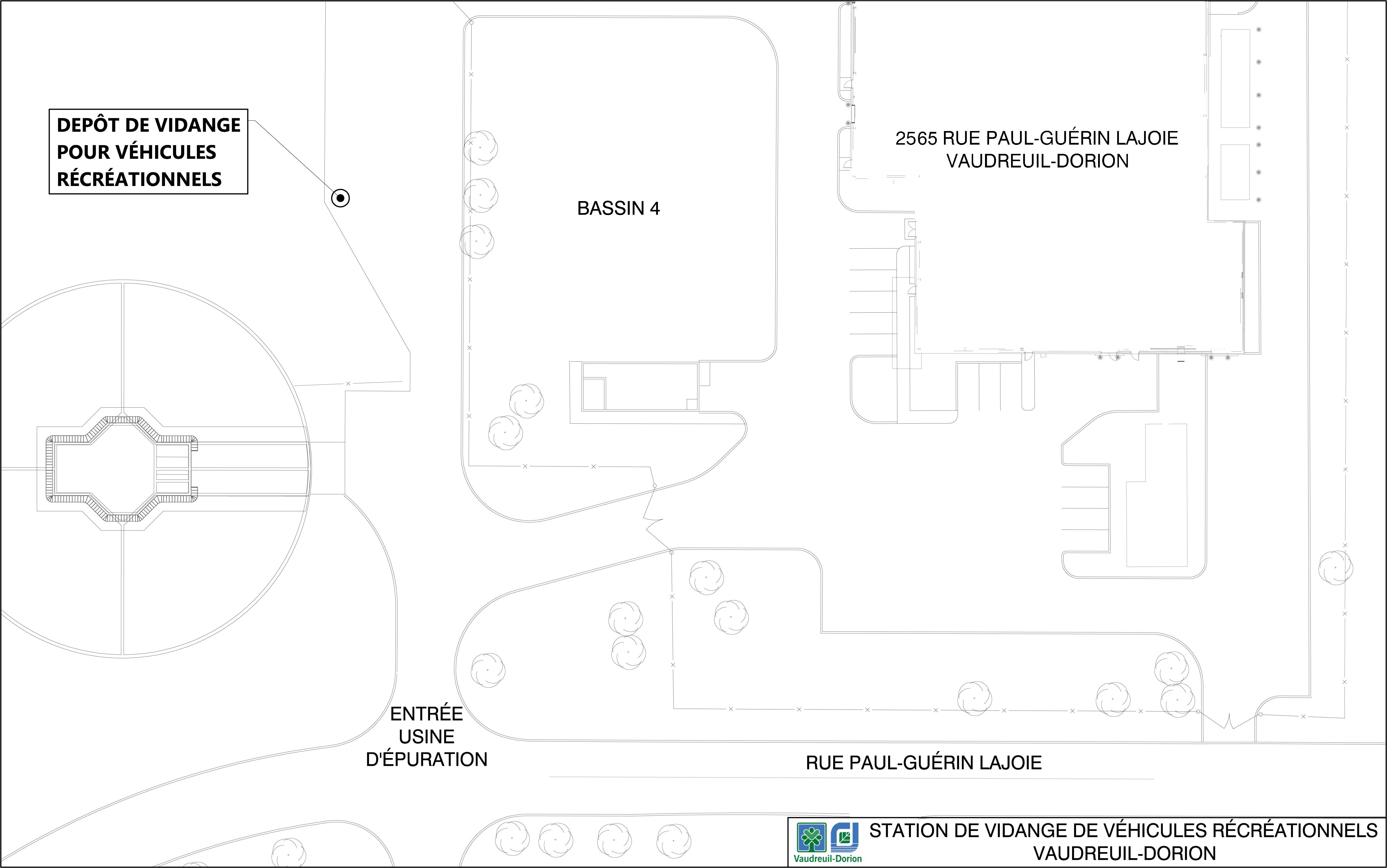
Accidental spill : report and notification
If you notice an accidental spill, please report it immediately to 911. In this way, the teams needed to intervene and contain the situation will be deployed as quickly as possible, to minimize damage to the environment and health.
If you are responsible for an accidental contaminant spill or a non-standard discharge to a wastewater treatment facility (sewer line, open ditch, etc.) - or have the potential to do so - you must report it to the Service des eaux de la Ville de Vaudreuil-Dorion by filling out the Accidental Spill Declaration form and sending it by e-mail, or by fax to 450-424-8570.
By-law No. 2008-47 regarding wastewater treatment for the Montreal Metropolitan Community (MMC)
Article 14 – Accidental spills and corrective measures
- a) Any person who is responsible for the accidental spill of one or more of the contaminants identified in Section 6 or of wastewater which does not comply with the standards of this by-law and the spillage of which is likely to reach or sure to reach wastewater works and be detrimental to public health, public safety, the environment or the wastewater works, must immediately report the spill to the person responsible for enforcing this by-law so that measures may be taken to prevent such damage.
- b) The Declaration shall include the location, date and time of the spill, duration of the spill, volume spilled, nature and characteristics of the contaminants spilled, name and telephone number of the person reporting the spill, and actions already taken or underway to mitigate or stop the spill (information requested on the form).
- c) The Declaration must be followed within 15 days by an additional declaration establishing the causes of the spill and the measures taken to prevent its recurrence (information requested on the form).
